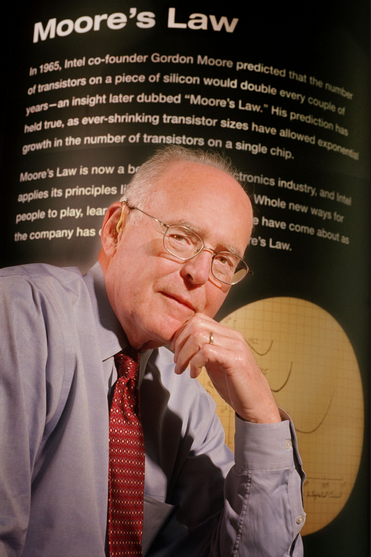 The world was vastly different in 1965. The smooth, compact smartphones and laptops of today were nonexistent, and civilization was on the verge of experiencing a revolution of technological growth and advancement. This is all thanks to Moore’s law, which paved the way toward making technology smaller and more easily accessible for both end users and businesses.
The world was vastly different in 1965. The smooth, compact smartphones and laptops of today were nonexistent, and civilization was on the verge of experiencing a revolution of technological growth and advancement. This is all thanks to Moore’s law, which paved the way toward making technology smaller and more easily accessible for both end users and businesses.
 Moore’s law is a series of observations made by the co-founder of Intel, Gordon Moore, that were published in Electronics Magazine in 1965. The general idea was that technology would grow exponentially as time goes on; specifically, the number of transistors available in a given die area doubles every two years. This essentially means that machines grow twice as powerful ever two years or so, making them significantly faster and more responsive as time goes on.
Moore’s law is a series of observations made by the co-founder of Intel, Gordon Moore, that were published in Electronics Magazine in 1965. The general idea was that technology would grow exponentially as time goes on; specifically, the number of transistors available in a given die area doubles every two years. This essentially means that machines grow twice as powerful ever two years or so, making them significantly faster and more responsive as time goes on.
As anyone who lives in today’s technology-laden society knows, this has proven to be true. Today’s technological advancements wouldn’t have been possible without Moore’s law. While it certainly helped shape the way technology has grown over the past several decades, has technology finally caught up with Moore’s law? Some might argue that technology has far surpassed the expectations of Moore’s law, and that further development is limited due to the physical and economical demands. As reported by ComputerWorld:
Conventional computers could be replaced by quantum computers and systems with brain-like, or neural chips, which function differently than current processors. Silicon could also be replaced by chips made using new materials, such as graphene or carbon nanotubes.
If you think of it in terms of physical limitations, this makes sense. Chips can only get so small, and Intel can only keep up for so long before chips become so small that they become miniscule. Even though Intel has been finding ways to keep up with Moore’s law, pushing forward and coming up with new ways to make technology cheaper will undoubtedly grow more challenging as time goes on and technology grows more complex.
In terms of economics, manufacturers are finding it more difficult to build the advanced factories required to build the processors and chips that are continuously decreasing in size. This is mainly due to the return on investment decreasing as time goes on. Since technology grows more affordable and more compact over time, consumer cost goes down, limiting the profits that are made. This can make it difficult to justify building new factories specifically designed for these chips. Despite this, researchers are determined to keep Moore’s law going as long as possible. If the size of a chip is limited, better materials will surface which allow for more efficient chip design.
Still, the legacy built upon Moore’s law has allowed the human race to build incredible machines over the past 50 years. Even computers from 15 years ago are now made obsolete by the smartphones we hold in our hands today. Despite the somewhat limited scope of Moore’s law, technology manufacturers are sure to continue improving processes and finding new materials that allow for more efficient, inexpensive new tech.

